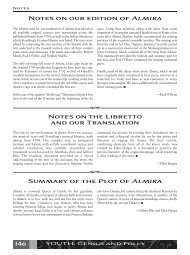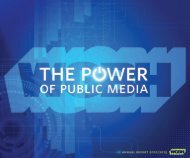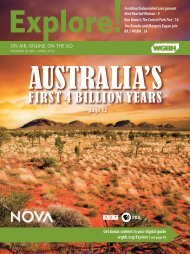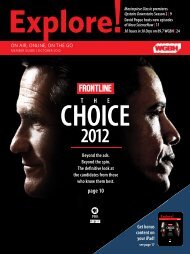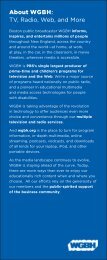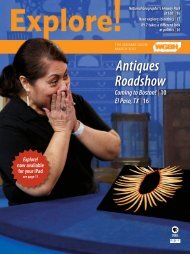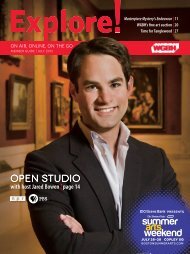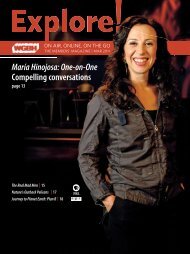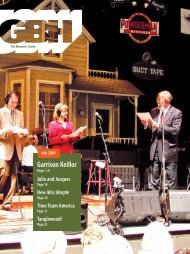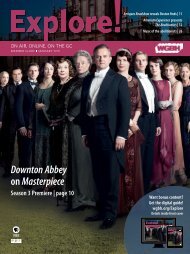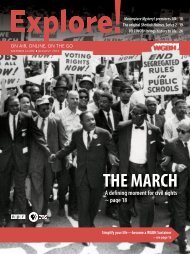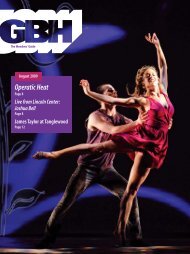New from Ken Burns: Prohibition - WGBH
New from Ken Burns: Prohibition - WGBH
New from Ken Burns: Prohibition - WGBH
Create successful ePaper yourself
Turn your PDF publications into a flip-book with our unique Google optimized e-Paper software.
Radio Spotlight<br />
A Conversation with <strong>Ken</strong> <strong>Burns</strong><br />
For 35 years, documentary filmmaker <strong>Ken</strong> <strong>Burns</strong><br />
has been an illuminating voice in our national<br />
conversation—on topics ranging <strong>from</strong> the Civil<br />
War to the Statue of Liberty to America’s national<br />
pastime. This month, <strong>Burns</strong> and co-producer Lynn<br />
Novick bring their signature substance and style<br />
to a painful and little-understood chapter in<br />
American history, detailing the rise, rule and fall of<br />
the 18 th Amendment in <strong>Prohibition</strong>. Their threepart<br />
PBS series will be featured in an outreach<br />
partnership with the National Constitution Center<br />
to foster a national conversation about civility and<br />
democracy. <strong>WGBH</strong>’s Tina Vaz recently caught up<br />
with <strong>Burns</strong> to talk about <strong>Prohibition</strong>, public radio<br />
and the state of our public discourse.<br />
QWhat drew you to the subject of<br />
<strong>Prohibition</strong><br />
always looking for good stories to tell,<br />
A<br />
We’re<br />
and <strong>Prohibition</strong> engages so many interesting<br />
aspects. It’s a story of single-issue political campaigns<br />
that metastasize with horrible, unintended<br />
consequences. Of smear campaigns against presidential<br />
politicians. Of unfunded Congressional<br />
mandates and the demonization of recent immigrants<br />
to the US. It’s about a group of people who<br />
felt they’d lost control of their country and wanted<br />
to take it back. And, of course, it’s about a colossal<br />
civic failure that resulted in the only repeal of a<br />
Constitutional amendment.<br />
QYou’ve said that each of your films asks:<br />
Who are we What does <strong>Prohibition</strong> tell<br />
you about who we are as Americans<br />
A<br />
Like all of our films, <strong>Prohibition</strong> doesn’t fully<br />
answer the question of who we are, but it<br />
deepens our understanding. <strong>Prohibition</strong>—if it’s<br />
taught at all—rarely gets past the familiar images<br />
of flappers, gangsters and gin joints. This film<br />
offers a closer look at how America’s “Great<br />
Experiment” was intricately intertwined with<br />
social factors such as women’s suffrage,<br />
Emancipation, industrialization and immigration.<br />
QWhy did you get involved with the<br />
“Civility and Democracy” project<br />
A<br />
Like most Americans, Lynn and I are shocked<br />
at the way in which our political dialogue has<br />
degenerated in recent years. There have been<br />
many other times in our history when civility<br />
failed, and there were consequences—the Civil<br />
War being the most powerful example. <strong>Prohibition</strong><br />
is a less pernicious example, but it’s an important<br />
one nevertheless. The failure of people to talk with<br />
each other and the absolutism of the various sides<br />
contributed to the problem. The film seemed a<br />
logical place to go public with a discussion of<br />
civility and democracy in our political discourse.<br />
QWhat role does public radio play in<br />
advancing civility and democracy<br />
radio has long been a beacon of<br />
A<br />
Public<br />
reasoned discourse in an otherwise relatively<br />
cacophonous world. That’s one of the reasons it’s<br />
still so influential despite the primacy of television<br />
and other visual media. Public radio consistently<br />
delivers news in a completely nonpartisan way<br />
and provides an intelligent and in-depth look at<br />
the issues. That alone earns it my utmost respect.<br />
QWhat are some of your public radio<br />
favorites<br />
A<br />
Morning Edition and All Things Considered are<br />
the two best programs on radio, followed<br />
closely by Weekend Edition. Once you start there,<br />
everything else is gravy, <strong>from</strong> A Prairie Home<br />
Companion to Wait Wait…Don’t Tell Me! to the<br />
myriad local programs, many produced by <strong>WGBH</strong>,<br />
that I listen to all the time.<br />
Q<strong>Prohibition</strong> continues your longtime<br />
collaboration with jazz musician Wynton<br />
Marsalis. Why is music important to your<br />
storytelling, and what does Marsalis bring to<br />
this project<br />
A<br />
Music is important because it delivers complex<br />
thoughts and emotions in an immediate<br />
and extraordinarily precise way. It’s a major element<br />
of filmmaking and too often added at the<br />
end rather than being an organic part. We record<br />
our music early in our editing process—sometimes<br />
even before editing begins—so that the<br />
music can inform it.<br />
We don’t have enough time to talk about<br />
Wynton Marsalis’s genius! He’s one of the greatest<br />
trumpet players and jazz composers on the planet<br />
today. He is the greatest teacher of jazz, this<br />
extraordinary American art form that has become<br />
a worldwide phenomenon. And he’s a very smart<br />
guy who continually surprises me with the depth<br />
and profundity of his thought. We’ve been friends<br />
for nearly 20 years, and I couldn’t imagine leaving<br />
home without him on a project like <strong>Prohibition</strong>.<br />
QYou’ve said that you’re in the “memory<br />
business.” How is our national memory<br />
faring in the age of Twitter<br />
have presidential candidates who don’t<br />
A<br />
We<br />
know the correct state in which the first battle<br />
of the American Revolution took place, and who<br />
can’t distinguish our Founding Fathers <strong>from</strong> our<br />
Founding Sons. A recent study showed that only<br />
9 percent of fourth graders could identify a photograph<br />
of Abraham Lincoln. That’s terrifying. What<br />
we’re trying to do in public media is to be a bulwark<br />
against the chaos and entropy that such a<br />
lack of knowledge fosters.<br />
QYou’re a longtime friend of <strong>WGBH</strong>. What<br />
do you think <strong>WGBH</strong> adds to the media<br />
landscape<br />
A<br />
Public media produces the best children’s,<br />
science, nature, drama, public affairs and, I’m<br />
told, history programming out there today. <strong>WGBH</strong><br />
is the big muscle car coming down the street. It<br />
has had an enormous influence on the history of<br />
public media and continues to set the gold standard.<br />
QWhat’s next for you<br />
A<br />
We just finished editing a film on the history<br />
of the Dust Bowl, which will be out in 2012.<br />
We’re beginning editing of a film on the Central<br />
Park jogger case, focusing on the five black and<br />
Hispanic boys who went to jail for a crime they<br />
didn’t commit. We’re about halfway through editing<br />
a first-ever series on Theodore, Franklin and<br />
Eleanor Roosevelt. And we’re beginning a biography<br />
of Jackie Robinson and a major history of the<br />
Vietnam War.<br />
QAny predictions for the Red Sox<br />
A<br />
We’re going to win the World Series. I say it<br />
every spring!<br />
<strong>Prohibition</strong> premieres 10/2, 10/3 & 10/4 at 8pm on<br />
<strong>WGBH</strong> 2 (learn more about the series on page 8).<br />
wgbh.org/prohibition 23



